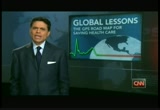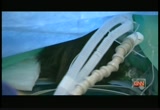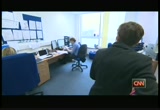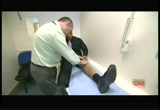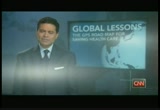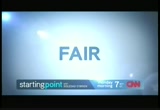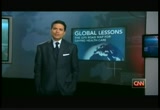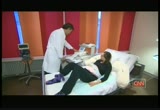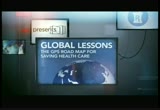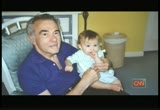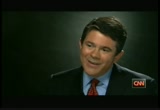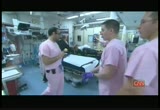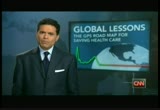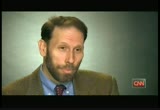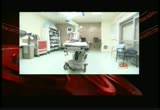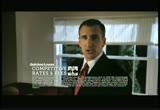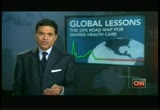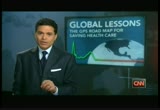tv CNN Presents CNN July 1, 2012 8:00pm-9:00pm EDT
8:00 pm
our mortality rate is twice that of sweden and japan. so what is our problem? in this hour in a "time" magazine essay, we will take you around the world to find out what lessons we can learn from others. we'll visit great britain, taiwan and switzerland to find out what those nations are doing right and what they are doing wrong. we will also show you some really interesting innovation going on back here in america. in one of the most poorest and crime-ridden cities in the nation. first, let's talk about the one thing americans are certain is bad. government-run health care across the atlantic in great bitten. is the nation's health service an evil death panel as some say? let's take a look.
8:01 pm
during america's debate over health care reform, critics said britain's government-run system was a bureaucracy that rationed care to those in need. were they right? britain does have a system that is as close to socialized medicine as any rich country gets. the government pays for everything, owns most of the hospitals and pays most of the doctors. but consider this. compared to americans, the brits have longer life spans, a lower infant mortality rate and a health care system that consistently ranks higher on every measure. all this and everybody's care is covered. no payments to doctors and no charges from your insurance company, and no kco pays or fee or nothing.
8:02 pm
one doctor performs a liver transplant surgery with a live donor. a young man is giving part of his liver to his younger brother. the river is cut in half with one part for the younger brother and the other part staying in the donor. >> the liver is a remarkable organ, so can you take pieces of it and it will function well. >> this cost tens of thousands of dollars, but the patient doesn't pay a thing. >> when patients come to us, we only evaluate them from the point of view of what they need. do they need a transplant. the costs never comes into it. as a surgeon i love that because it focuses on the care that i can deliver. >> people go their entire life without paying a single up front
8:03 pm
cost. >> the doctor here is the chair of the college of practitioners. >> all service is fair, and it's irrespective of your illness, you will be able to access health care. that is what we require. is that what is a fair and honest health system. >> compare that to the u.s., where an estimated 137,000 people died over seven years because they were uninsured. of course the brits do pay for their health care in another way, with taxes. the sales taxes are a whopping 20%, and income taxes are as high as 50%. all of that money feeds a health care bohemith. so you think it would be inefficient. that seems sensible, right? the private sector can do things more efficiently?
8:04 pm
it doesn't work in health care. >> a bureau chief for the "washington post" toured the health care systems for his recent book "the healing of america." >> the least efficient pairs is the insurance companies, and that's a 30% tax on every dollar you spend on health care. britain is totally socialized medicine and administrative costs, 5%, and canada is private doctors, and public payers, and 6% administrative costs. so it turns out in health care, governments are doing this more efficiently than our private sector. >> one reason, private insurers in america spend more money on nonmedical costs, like ads and review claims to help them stay profitable. another way they can be more efficient is by having a more coordinated approach to health care. for instance, the nhs rewards
8:05 pm
primary care doctors with bonuses for good health, like getting people to stop smoking. that means lower health care costs for the country. on average, the british spends $3500 a person on health care. in the u.s., we spend around $8,500. >> the only way to make the system work, and the only way to get costs under control, you have to be a little cruel. you have to say we will pay for this and won't pay for that. >> that's absolutely true. the british health minister said to me, we cover everybody. but we don't cover everything. >> not covering everything, the so-called rationing of care is the brittist system's most controversial element, and one man in particular is at the center of that system. >> occasionally we do find
8:06 pm
ourselves up against everybody, the physicians and the patients and media, and sometimes it's a real challenge. >> so andrew dillon is known as nhs, and it's the government body that decides which treatments the governor will and will not pay for. >> it's about the evidence of what works best. the clinical studies, and the research done in this country and across the word. >> it's weighed by independent panels by doctors, not government bureaucrats. the policies involves some of the most vexing dilemmas in medicine. >> in the end there is nothing else in life like facing death,
8:07 pm
and we have to face that, and we need to make sure we are keeping our eyes on everything else that we need the nhs to do with us. >> another controversial aspect of british health care, long wait times for certain procedures. in the early 1990s, you could wait more than a year to be admitted to a hospital for a nonemergency. the nhs rule book now gives patients the right to be treated within 18 weeks of being referred. that's a long time to be standing in the queue. britain's government system provides good care for all and is more cost-effective than one might imagine. so is there a way to provide care for all with less government? when we come back, we will visit a country that went from almost half of its population being uninsured to nearly full coverage in less than a year and without breaking the bank. e there've been some good days.
8:08 pm
8:09 pm
and the next great idea could be yours. see life in the best light. [music] transitions® lenses automatically filter just the right amount of light. so you see everything the way it's meant to be seen. experience life well lit, ask for transitions adaptive lenses. in here, every powerful collaboration is backed by an equally powerful and secure cloud. that cloud is in the network, so it can deliver all the power of the network itself. bringing people together to develop the best ideas -- and providing the apps and computing power to make new ideas real. it's the cloud from at&t. with new ways to work together, business works better. ♪
8:10 pm
8:11 pm
system. taiwan had that unique opportunity, and that story provides eye opening lessens for the united states. economies like tie yaaiwan and singapore skyrocketed in the 1990s. they were joining the ranks of rich countries in no time. >> the health care insurance system was not good at the time. >> a health policy expert at princeton says 41% of taiwan's population had no health insurance in 1995. >> we paid out of pocket. and for the really poor, then you pray a lot. >> so taiwan's government decided to reform its system of care from the ground up. william show, a professor of
8:12 pm
economics is one of the leading health care gurus. >> we invited experts from all the whole range of countries, so we can throw out the lessons, and their experience for taiwan. >> the panel considered the u.s., it's close's geopolitical ally as a model for health care. they were not impressed. >> can you learn what not to do from the united states rather than learn what to do. >> they also looked at great britain, but the brit's government run system was producing long wait times in the '90s. >> it's not the best or most efficient way of running operations. >> and then germany, they had so many different funds and the administrative costs were just too high. so taiwan went with a single pair insurance model where there is only one insurer in the
8:13 pm
market, the government. they combined that with private doctors and hospitals to avoid too much bureaucracy. the system looks like american medicare, although it's for everybody, and not just the elderly. the president at the time made a huge push to implement the plan quickly in 1995. miraculously, taiwan's uninsured dropped from 41% to 8% in less than a year. taiwan has a highly rated health care system. what is more, it's a rock star when it comes to holding down costs. the taiwans spent 7% on their health care, and that's compared to our 17%. the government drives a hard bargain on fees with providers, and taiwan can monitor its spending with this cool device, the smart card. you swipe it anytime you go to
8:14 pm
the doctor, and they can pull up recent medical history, and when you are done you will have a record of that day's visit, and then spent a copy of the bill right away. compare that to the medicare in the u.s. which can only estimate the spending levels two years after the fact. >> in taiwan, that's recorded on a daily basis. >> but wouldn't all of that government stinginess make it hard to see the doctor? surprisingly, that's not the case. americans go to the doctor four times a year on average. the taiwanes go less. >> the average stay in taiwan is ten days, and in the u.s. it's five days. >> how do they provide that care at such a low cost?
8:15 pm
>> one way, the doctors work their tails off. the primary clinic is open 11 hours a day, six days a week. >> may take care of more than 200 patients a day. >> the fees that government insurance fees doctors are very low. he gets $14 for each primary care visit. his colleague in the u.s. makes $100 per patient. they just raised the amount people pay to get more in the system, but don't expect politicians to do something like that very often. >> taiwan has succeeded in raising premium rates twice. just twice. >> no matter which health care system you visit, politics always comes into play. the next country we're going to visit has some remarkably similar politics to our own. it passed a version of obamacare
8:16 pm
18 years ago. has it worked out or is it a disaster? find out when we come back. what happens when classroom teachers get the training... ...and support they need? schools flourish and students blossom. that's why programs like... ...the mickelson exxonmobil teachers academy... ...and astronaut sally ride's science academy are helping our educators improve student success in math and science. let's shoot for the stars. let's invest in our teachers and inspire our students. let's solve this.
8:17 pm
an accident doesn't have to slow you down. with better car replacement, if your car is totaled, we give you the money for a car one model year newer. liberty mutual auto insurance. a little bird told me about a band... ♪ an old man shared some fish stories... ♪ oooh, my turn. ♪ she was in paris, but we talked for hours... everyone else buzzed about the band. there's a wireless mind inside all of us. so, where to next? ♪
8:20 pm
insurance can work, but let's face it government insurance for all is probably not a good campaign slogan for many americans right now. so we searched the world for a completely private model. no government insurance or state-run hospitals. we found one in europe, of all places. imagine an alternate universe where a version of obamacare has been the law of the land for almost two decades. you have not entered the twilight zone. you're in switzerland. right around the time president clinton was pushing health care reform in the 1990s, ruth dreyfuss, a left-wing swiss official faced a lot of tough questions. >> will we have to pay for the treatment of drug addicts? will we have to pay for obese people? will we have to pay for
8:21 pm
abortion? >> switzerland is business friendly and always have gone its own way, charting its own course in health care with private providers and private insurance. and that's not so rare according to one journalist. >> one thing that many believe about health care around the world is that other rich countries around the world all have socialized medicine. is that true? >> that's baloney. some governments do provide care and pay for it but a lot of democracies, belgium, japan, they cover everybody in the private system, private docs, and hospitals. germany and switzerland, they don't have public health care. >> but the swiss were getting fed up with the private insurance system in the 1990s. costs were rising and premiums were higher for women and the elderly, and those with
8:22 pm
preexisting conditions had trouble getting coverage. some were foregoing insurance altogether. >> people were flying out of the insurance, so we had to stop this. >> dreyfuss who would become the first woman president, she gave subsidies to the poor and stopped insurance companies for rejecting people for their medical history. that's exactly what president obama's law would do. but in switzerland, it was an uphill battle. the parliament could barely squeak by. >> nobody was happy but everybody could accept. >> how was the swiss version of president obama's plan fairing after put in place? everybody is covered and the care is still top notch. the swiss enjoy one of the
8:23 pm
longest life expectancies in the world. >> we have an extremely comfortable health care system. the access is easy. you don't have to wait. >> hospitals have become more like five-star hotels offering health care. >> the swiss law went above and beyond obamacare. insurance companies were already banned from making a profit on basic health care coverage. under the new law they had to expand that basic package covering more procedures. >> even very expensive pharmaceuticals are paid by the insurance plans and have to be paid. >> the swiss system is world renown for the choice it provides its users. >> i chose the doctor i wanted to go to. i went there, and it was seamless. >> we caught up with jocelyn mills and her husband, two americans living in switzerland.
8:24 pm
jocelyn was expecting anytime. she could see a specialist anytime without a referral from a physician like in the u.s. >> i waited three hours in an overcrowded waiting room to see somebody and then to see a specialist if anything was wrong. so i don't have that here. >> another bonus, health insurance is not linked to employment. plus, you can change your insurer every year if you want. >> the choice is such that it's sometimes confusing. you know, you have in each town you are living, a choice of probably 100, 200 different plans. and then you almost need a coach or somebody helping you to choose your health care plan. >> experts worry the swiss don't read the cost saving choices for insurance because there are so many of them, and that may explain why the costs are still high, 11% of the gdp.
8:25 pm
>> you can't make a perfect law, but you can make a law, and they all have side effects. we are still working to make this law better. health care costs are rising all overt world, but in the united states, health care is almost twice as expensive as everywhere else. why is that? we'll explore that question next. why not make lunch more than just lunch? with two times the points on dining in restaurants, you may find yourself asking why not, a lot. chase sapphire preferred.
8:29 pm
there is no greater threat to the american dream than the rising cost of health care. it takes up around one-fifth of the economy, and it could crowd out vital spending on education and infrastructure and science and technology, not to mention the military and social security. how on earth did we get here? what can we do about it? >> i think part of the under pinnings of the system is we are all kidding ourself. there's no paying for it, except for all of us. >> the ceo of the game show network is an unlikely agitator in the health care debate. he got involved after his father went to the hospital with
8:30 pm
pneumonia and died from an infection while he was there. >> i saw hospital with less impressive information technology than my dry-cleaner has, than my auto mechanic has. a couple times my father was taken for procedures meant for other patients, and there was trash on the floor. this is the intensive care unit we are talking about. >> the fate of his father is all too common. every year an estimated 100,000 americans die have an infection they got in a hospital. >> once i got beyond the personal elements of the tragedy, there was something unusual about this, just in the scope of how the world works today. and i began to think about the lack of real accountability to customers. and the incentives to bad behavior the dominate the way the industry is structured. >> unlike many markets, customers don't pay their own bills in health care, instead
8:31 pm
it's a private insurance company or the government that pays. in the case of his father, medicare picked up most of the tab, which was over $600,000 before a hospital discount. >> to all of us it seems terrific, right? i look at it a different way. if medicare said to my mother, you pay the bill and a hospital came to my mother and said here is what we charge for killing your husband, the collection would have paid zero. there is no way my mother or any of us would pay that bill. >> he summed up his view in an article in the atlantic, "how american health care killed my father." they said if patients spent more of their own money in the health care, prices would come down. >> the whole idea of using insurance to pay for health care is wrong. >> the problem with insurance is that it's very costly, and it's very costly to pay for anything.
8:32 pm
and it's never used to finance anything is that not rare. if you look at the health care system, what you see is a system that lacks any of the normal disciplines we see in anything else. >> give me an example of someplace where you find market forces can actually work the way you are describing? >> you know, around the fridges of health care, things that look like health care that are not in the health care economy, they are not insured. we see it inc cosmetic surgery, and care for pets. >> despite all the expensive equipment, lasik doctors compete with your business with ads that tell you about their safety record and prices. >> ask a simple question of your viewers. how many of them know of the safest hospital in their
8:33 pm
neighborhood? why not? why is there not a billboard saying go up town, downtown will kill you? >> goldhill's solution, insurance could only cover catastrophic events, and while routine care, like doctor apartments should be paid for by a health savings accounts. >> we have to care about the accounts. what we are doing is destroying the american dream. >> this is a staff writer for "the new yorker," and the author of best selling books on health care. he says there is an important fact to consider. >> the sick account for most of the costs. 5% of patients are 50% of the costs, and these are folks for
8:34 pm
whom the bills are $40,000 and $50,000. >> limited insurance could cat strafic events and serious illnesses, insurance companies would still be paying for a lot of our health care costs, figuring out how to treat the sickest of the sick is a trillion-dollar question. >> how to care for the patients on medicare, who has more than ten specialists, physicians by the last year of their life. if you have ever taken care of an elderly parent, you know how much you want to tear your hair out, they just won't talk to each other. >> what they need is a more coordinated approach to care. some doctors tend to prescribe too much medicine, he says. that's less efficient, but it's more profitable. >> we have focused on getting the best drugs, the best devices and the best specialists. we think little about how we fit it together so it works well.
8:35 pm
>> what is wrong with medications, and surely more is better, and why not have more mris? >> more at the right time is better. we are doing more ct scans, and they cause cancers, and second, doing more of these kinds of tests end up raising -- maybe there is a spot there and maybe there is not, and that leads to more surgery and risks. >> a more coordinated approach to care may reduce needless testing and lower costs. >> president obama's health care law encourages more coordination, giving funding to providers to come up with more efficient and more effective ways to provide care. >> the concentration on the 5% of patients who are the highest cost patients and how badly we take care of them is unleashing
8:36 pm
enormous innovations, and i think we are about to enter a period of very rapid change. >> when we come back, we will show you a bold example of that change, a health care experiment being conducted in one of the roughest cities in the country, and it's working. and some difficult ones. but, through it all, we've persevered, supporting some of the biggest ideas in modern history. so why should our anniversary matter to you? because for 200 years, we've been helping ideas move from ambition to achievement. and the next great idea could be yours. ♪ and the next great idea could be yours. see life in the best light. [music]
8:37 pm
transitions® lenses automatically filter just the right amount of light. so you see everything the way it's meant to be seen. experience life well lit, ask for transitions adaptive lenses. [ male announcer ] for our families... our neighbors... and our communities... america's beverage companies have created a wide range of new choices. developing smaller portion sizes and more low- & no-calorie beverages... adding clear calorie labels so you know exactly what you're choosing... and in schools, replacing full-calorie soft drinks with lower-calorie options. with more choices and fewer calories, america's beverage companies are delivering. i think we should see other people. in fact, i'm already seeing your best friend, justin. ♪ i would've appreciated a proactive update on the status of our relationship. who do you think i am, tim? quicken loans? atuicken loans, we provide you with proactive updates
8:38 pm
on the status of your home loan. and our innovative online tools ensure that you're always in the loop. one more way quicken loans is engineered to amaze. a little bird told me about a band... ♪ an old man shared some fish stories... ♪ oooh, my turn. ♪ she was in paris, but we talked for hours... everyone else buzzed about the band. there's a wireless mind inside all of us. so, where to next? ♪
8:39 pm
8:40 pm
utility crews are trying to restore power in the northeast, and close to a million people are close to facing a hot night in the dark. 20 states issued heat warnings or advisories today and 1600 high temperature records have been broken all around the country. in colorado, families are getting their first look at what remains of their homes after a deadly wildfire tore through the neighborhoods of colorado springs. roads will be open for several hours allowing families to examine what is left of their houses. the area is under a red flag warning today, which means there's a chance that fast-moving fire could flare-up again. mississippi's only abortion clinic will remain open for now, because the court is allowing the clinic to remain open until a july 11th hearing. it was facing closee closure un
8:41 pm
state law that takes affect today. skyrocketing health care costs created what some say is one of the biggest economic bubbles in american history. doing nothing could lead to dire consequences. that's why some providers are experimenting with innovative approaches to health care before it's too late. >> we are spending a whole lot in our country on health care and not getting our money's worth. and that's a tragedy. >> he is trying to look at a health care. >> we cover fewer people in our country. >> he is tackling this
8:42 pm
disconnect in camden, new jersey. one of america's poorest cities. he has been a family physician here for 11 years. his mission started on this street in 2001, with a gunshot. an unremarkable sound in camden, which has one of the highest murder rates in the country. >> i was sitting at my desk one evening, and shots rang out. >> he ran outside where the victim was lying a pool of his own blood and nobody was doing anything. >> i started yelling at one of the sergeants, and why didn't you do anything, and he said we didn't want to dislodge the bullet and it was a complete blowoff and it showed a lack of compassion and concern for the dignity of peoples' lives. the victim was a senior at rutger's university that talked about running for mayor one day. his death triggered a passion to
8:43 pm
reform the police department, but he says it was mired in dysfunction. >> i said i give up on helping to reform the police department, but i think i can take a lot of the ideas that i learned in the process and bring them to health care. >> he had been mapping crime data to locate the city's most violent corners, just like the new york city police department did in the 1990s, producing great success. so he started mapping health care spending and identifying hot spots where the costs were the highest. using medical billing records, he found that just 1% of the patients accounted for 30% of health care costs in camden. and that's not all he discovered about the city's three hospitals. >> we learned that somebody went 113 times in one year, and somebody went 324 times in five years. and in similar work up in trenton, somebody went 450 times in one year. >> these were people with complicated medical histories
8:44 pm
and chronic illnesses. one patient alone wracked up $3.5 million in medical bills over a five-year period. >> they are the difficult patients to treat and nobody is being paid to pay attention to them. >> what is more, camden's problem is america's problem. just 5% of americans accounted for half of our nation's health care costs in 2009. this is perhaps the crucial statistic to understand about america's health care problem. if he could crack his city's cost crisis, maybe his model could help the country. >> we have met with his primary care doc. >> he founded the health care provider, a group of nurses and social workers and volunteers who treat the city's worst of the worst, one patient at a time. every day the group gets data from all the city's emergency rooms in real time.
8:45 pm
that's the first time this has ever happened anywhere in america. >> it's a nice day for this. >> jason, a former teacher and registered nurse is making a house call to 52-year-old lillian paris. >> hello. >> she was admitted to the hospital eight times last year, mostly for respiratory distress. she literally has a bucket full of medications for chronic lung disease, sleep apnea and other conditions. jason and his colleagues got a ventilator placed in villain's home. >> we're talking about the new ventilator. >> see saw her pulmonalgist, and he said, we have not seen you in a while and you look great. >> the city's sickest are often
8:46 pm
hard to reach. some don't have phones. jason and his team do routine drive-bys to see patients like earl. >> jason from the coalition. how are you doing? >> earl is one of the biggest er users in camden, and he serves from epilepsy, hypertension and congestive heart failure. >> trying to make it through another day. you know what i am say stphg the three amigos came earlier. >> the three amigos, that's the term earl uses to describe the three that visited him earlier in the day. >> he found that many expensive patients like earl were concentrated in certain areas of the city. one billing alone, a subsidized apartment tower accounted for $12 million in hospital costs over five years. >> the patients were appalled
8:47 pm
that somebody made that much money and they felt so sick and they still felt like it was so hard for them to access services. >> so they set up a clinic in the building so the residents can get preventive care. >> this is not a story of parkway bad patients, bad doctors, bad hospitals and evil insurance companies, it's a story of a broken system that has miss aligned incentives so the patients are not getting their needs met. >> he says only evidence suggests his experiment is working. hospital use is down for participating patients and his model is being predicated in two other new jersey hot spots. these programs are bolstered by new legislation that rewards care takers for preventing and controlling illnesses instead of just treating them. it was signed last august by governor chris christie with
8:48 pm
bipartisan support. >> rather than a cycle, it creates a cycle where we are rewarded for doing the right thing. >> here is the problem. the coordinated approach to reducing costs is essentially taking away patients and business from hospitals and doctors. that threatens the profits of most of the established players in health care. when we speak of reducing health care costs, remember that for many powerful interests, that translates into taking away my business. but if he does succeed in bending the cost curve here -- >> it would make the rest of the country look silly if the city of camden can reduce costs, and it's a political, spiritual and moral problem. >> when we come back, i will give you my thoughts on the health care debate. stay with us. it's very important to understand
8:49 pm
how math and science kind of makes the world work. in high school, i had a physics teacher by the name of mr. davies. he made physics more than theoretical, he made it real for me. we built a guitar, we did things with electronics and mother boards. that's where the interest in engineering came from. so now, as an engineer, i have a career that speaks to that passion. thank you, mr. davies.
8:50 pm
[ male announcer ] for our families... our neighbors... and our communities... america's beverage companies have created a wide range of new choices. developing smaller portion sizes and more low- & no-calorie beverages... adding clear calorie labels so you know exactly what you're choosing... and in schools, replacing full-calorie soft drinks with lower-calorie options. with more choices and fewer calories, america's beverage companies are delivering. so how much do we owe you? that'll be $973.42. ya know, your rates and fees aren't exactly competitive. who do you think i am, quicken loans? [ spokesman ] when you refinance your mortgage with quicken loans, you'll find that our rates and fees are extremely competitive. because the last thing you want is to spend too much on your mortgage. one more way quicken loans is engineered to amaze.
8:53 pm
the best way to reform american health care? i am reminded of the old irish joke. a couple is lost in the irish countryside and stops to ask a local the best way to get to dublin. well, i wouldn't start from here, he replies. the american health care system is partly state subsidized and overall highly inefficient at delivering care at a high price. i am a big fan of the premarket. i think it has an almost magical ability to allocate resources and generate growth. but precisely because it's so powerful, in places where it doesn't work well, it can cause huge distortions. the nobel prize winning economists outlined in the 1960s why markets don't work very well when it comes to health care.
8:54 pm
he explained that people don't know when they will need health care. and that when they do need it, the cost is often prohibited. that means you need some kind of insurance or a government-run system. now if we decided as a society that it's okay that when people suddenly discover they need health care they can get it only if they can pay for it, and that would work, but it would mean the vast majority of americans wouldn't be able to pay for that triple bypass or hip replacement when they need it. the market would work just as it works for bmw cars. people that can afford it can get it and people who can't don't. but every reach country in the world and many of the not-so-rich ones decided many should have access to basic health care, and given that, a pure free market model simply can't work. remember, even if one were to have only a catastrophic
8:55 pm
insurance model, that's where all the costs are, just 5% of the patients in the united states account for 50% of health care costs. and taking care of these c catastrophic illnesses is what drives american's costs up. a general insurance system can only work if everybody is insured, and that's what the swiss and taiwan people found out, and insurance companies will spend most of their time and effort trying to kick sick people off the system or deny coverage to those that might get sick. that's why the heritage foundation, a conservative think tank came up with the idea of the individual mandate requiring people buy insurance in exactly the same way people are required to buy car insurance. that's why mitt romney chose this model as a friendly system when he was governor for
8:56 pm
massachusetts, and that's why newt gingrich praised the model as the most affordable health care in years. the obama health care bill expands access to 30 million americans. that's good economics. it's also the right thing to do. but it does little in the way of controlling costs. there are several experiments and pirate programs in it, and new trends are emerging such as the one we saw in camden, but little in the way of systemic cost controls and that's largely a failure of nerve in the entire political establishment. every expert realizes no matter of system of health, you need to have some kind of board that decides what is covered and what is not. now, this has been demagogued as death panels when it's really the only sensible way to make the system work. nobody is saying that you can't get any medical procedure you
8:57 pm
want, merely that there are some that your insurance won't pay for. the other unusual aspect in health care is that buyers really don't have much knowledge or power. can you decide you don't want a new car, and you can comparison shop for a new tv, but you can't really decide that you don't want a heart bypass. that's why costs have come down in optional areas like lasik surgery, but not in ones where the consumer really can't walk away. a final thought, you must reason for principles, that's good, but also you must reason with the facts on the ground. all of them, including free market havens like taiwan, have found that they need to use an insurance or government-sponsored model. and all of them provide
8:58 pm
universal health care at much, much lower costs than you do. maybe there is a theoretical free market model out there that would work perfectly, but right now in the world that we are actually living in, some kind of mixed messy health care system is what we have, and our task is not really to abolish it in favor of a utopia that might come, but to improve it so americans can get good care at reasonable prices like so much of the rest of the world. thanks for tuning in to this gps special. can you read more of my thoughts on "time" magazine, and catch my regular show on sundays at 10:00 a.m. and 1:00 p.m. eastern, and international viewers can go to the website for view times. and tonight, oliver stone
8:59 pm
gets prickley about my questions. >> there's a lot of twists. it's a wild ride. >> and the world of green since he made wall street. plus, his unforgettable past. what was the greatest -- >> i have been through so many. i'm lucky, you know. >> and now his project -- >> i got to get to work. i don't know if i can drive. >> i will drive you. i will feel fine. >> it's as racy as ever. >> i don't know if you can say it on primetime cnn. >> one thing you thought he would never see him do.
98 Views
IN COLLECTIONS
CNN Television Archive
Television Archive  Television Archive News Search Service
Television Archive News Search Service 
Uploaded by TV Archive on

 Live Music Archive
Live Music Archive Librivox Free Audio
Librivox Free Audio Metropolitan Museum
Metropolitan Museum Cleveland Museum of Art
Cleveland Museum of Art Internet Arcade
Internet Arcade Console Living Room
Console Living Room Books to Borrow
Books to Borrow Open Library
Open Library TV News
TV News Understanding 9/11
Understanding 9/11